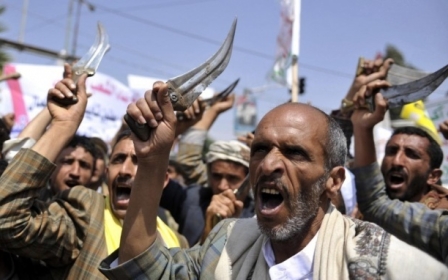Houthi militia clash with Yemen presidential guard

Fierce clashes erupted in the Yemeni capital on Monday between the presidential guard and Shiite militiamen who have been in control of the city for four months, witnesses said.
The clashes have killed at least two people and wounded 14 others, a medical source said.
The source at the Quds Military Hospital said the 14 wounded and the bodies of the two dead had been brought to the facility close to the presidential palace in southern Sanaa, where the clashes erupted on Monday.
The Shiite militia fired on the convoy carrying Prime Minister Khalid Bahah in the capital Sanaa but he escaped unharmed, Information Minister Nadia Sakkaf said.
Shelling and gunfire could be heard as smoke rose over parts of the city, and residents fled many neighbourhoods, and many embassies have reportedly shut their doors due to fears over the clashes.
The Houthi militiamen, known as Ansarullah, had been deploying reinforcements near the presidential palace, which remained under regular army guard after they overran Sanaa in September.
The presidential guard too deployed reinforcements to the streets surrounding the palace complex and outside the residence of President Abdrabuh Mansur Hadi, witnesses said.
Tensions have been running high in Sanaa since the Houthis abducted Hadi's chief of staff Ahmed Awad bin Mubarak on Saturday, in a bid to extract changes to a draft constitution he has been overseeing.
Mubarak heads the national dialogue set up after veteran strongman Ali Abdullah Saleh was forced from power in February 2012 following a year of bloody Arab Spring-inspired protests.
The Houthis said they had seized the top aide to prevent the violation of a UN-brokered agreement they reached with the president after their takeover of the capital last September.
The deal provided for the formation of a new government and the appointment of Houthi advisers to the president.
In return, it stipulated that the Houthis withdraw from key state institutions they had seized.
Political sources said representatives of the Houthis and former strongman Saleh's General People's Congress party walked out of a meeting on the process headed by President Hadi on Saturday.
Hadi has been struggling to assert his authority since the Houthis seized Sanaa on 21 September.
Since their takeover of the capital, the Houthis have pressed their advance into mainly Sunni areas south of Sanaa, where they have met deadly resistance from Sunnis.
Shabwa province to halt oil flow unless official freed
The governor of Yemen's southern province of Shabwa warned Sunday that oil companies will turn off their taps at midnight unless the Shiite militiamen free Mubarak, who is from Shabwa.
Mubarak was one of the representatives in the dialogue of the Southern Movement, which seeks autonomy or secession for the formerly independent south.
"Oil companies in Shabwa will stop production starting midnight if Ahmed Awad bin Mubarak is not released," said the governor, Ahmed Ali Belhaj.
Yemen's only gas terminal of Belhaf, which is located in Shabwa, would also stop operating, he said.
An industry official confirmed to AFP that Shabwa's oil companies had received orders to halt their operations.
Shabwa has three oilfields and produces about 50,000 barrels per day.
The tribes also threatened to take escalatory measures in case bin Mubarak was not released, including contacting their peers in the neighbouring provinces of Ma'rib and Hadhramaut to take similar moves.
Stay informed with MEE's newsletters
Sign up to get the latest alerts, insights and analysis, starting with Turkey Unpacked
Middle East Eye delivers independent and unrivalled coverage and analysis of the Middle East, North Africa and beyond. To learn more about republishing this content and the associated fees, please fill out this form. More about MEE can be found here.




